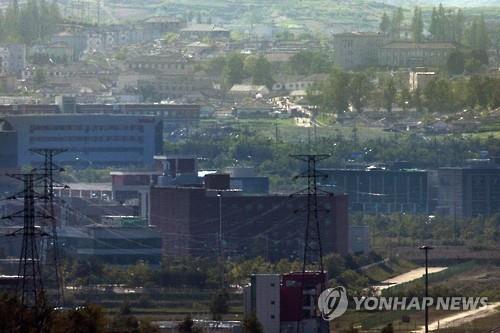North Korea appears to have a relatively well-established underground banking system as the country's central bank fails to provide funds to companies amid an economic crisis, a report claimed Thursday.
According to the report by the state-run Export-Import Bank of Korea, the North's underground banking, where money is transferred through informal rather than formal banking, took shape in the 1990s as a serious economic crisis made its central bank unable to lend money to corporate borrowers.
Under such circumstances, private money lenders started to provide funds to construction companies, service providers and manufacturing firms after establishing a network with state-run corporations.
According to the report by the state-run Export-Import Bank of Korea, the North's underground banking, where money is transferred through informal rather than formal banking, took shape in the 1990s as a serious economic crisis made its central bank unable to lend money to corporate borrowers.
Under such circumstances, private money lenders started to provide funds to construction companies, service providers and manufacturing firms after establishing a network with state-run corporations.

"North Korea's private financing has now evolved into a market that has a supply-demand structure and even a remittance system," the report said.
Underground bankers served mainly as money exchangers in the 1980s before expanding into loan sharking in the 1990s, and private lending and investment in the 2000s, it said, adding they have established a money remittance system in this decade.
North Korea's underground banking further expanded after Pyongyang ordered state companies to raise funds needed for production on their own, while private money lenders are even credited with contributing to the recovery of its economy by investing in diverse industries and running companies, it said.
The report also said the development of North Korea's underground banking into a market system has helped stabilize interest rates in the impoverished and reclusive country.
Monthly interest on loans ranged from 13 percent to 15 percent in the 2000s, but the rate has fallen to the 5 to 10 percent range in the 2010s.
"North Korea has no choice but to recognize the expansion of underground banking and is even pushing for measures to regularize foreign currency traded on the black market," the report said. "The private financing market is expected to be more specialized down the road, which could serve as a catalyst for the market economy in the country, and its reform and opening."
North Korea has suffering from economic hardships, hit by international sanctions on the secretive country for its nuclear and missile ambitions. In March, the U.N. Security Council slapped tougher sanctions on Pyongyang for its fourth nuclear test in January and long-range rocket launch in the following month.
In early May, North Korea's young leader Kim Jong-un unveiled the nation's first five-year economic plan in decades, calling for the country to modernize to kickstart its moribund state-dominated economy.
According to South Korea's central bank, the North Korean economy grew 1 percent on-year in 2014, slowing from the previous year's 1.1 percent gain, hit by low output of corn and potatoes.
Estimates of the North's 2015 economic growth are not available yet. (Yonhap)
Underground bankers served mainly as money exchangers in the 1980s before expanding into loan sharking in the 1990s, and private lending and investment in the 2000s, it said, adding they have established a money remittance system in this decade.
North Korea's underground banking further expanded after Pyongyang ordered state companies to raise funds needed for production on their own, while private money lenders are even credited with contributing to the recovery of its economy by investing in diverse industries and running companies, it said.
The report also said the development of North Korea's underground banking into a market system has helped stabilize interest rates in the impoverished and reclusive country.
Monthly interest on loans ranged from 13 percent to 15 percent in the 2000s, but the rate has fallen to the 5 to 10 percent range in the 2010s.
"North Korea has no choice but to recognize the expansion of underground banking and is even pushing for measures to regularize foreign currency traded on the black market," the report said. "The private financing market is expected to be more specialized down the road, which could serve as a catalyst for the market economy in the country, and its reform and opening."
North Korea has suffering from economic hardships, hit by international sanctions on the secretive country for its nuclear and missile ambitions. In March, the U.N. Security Council slapped tougher sanctions on Pyongyang for its fourth nuclear test in January and long-range rocket launch in the following month.
In early May, North Korea's young leader Kim Jong-un unveiled the nation's first five-year economic plan in decades, calling for the country to modernize to kickstart its moribund state-dominated economy.
According to South Korea's central bank, the North Korean economy grew 1 percent on-year in 2014, slowing from the previous year's 1.1 percent gain, hit by low output of corn and potatoes.
Estimates of the North's 2015 economic growth are not available yet. (Yonhap)



![[KH Explains] Hyundai Motor’s plan for new landmark keeps hitting bumps](http://res.heraldm.com/phpwas/restmb_idxmake.php?idx=644&simg=/content/image/2024/05/13/20240513050626_0.jpg&u=20240513192803)



![[Grace Kao] American racism against Stray Kids](http://res.heraldm.com/phpwas/restmb_idxmake.php?idx=644&simg=/content/image/2024/05/13/20240513050827_0.jpg&u=)



![[Graphic News] Over 80% of people filing bankruptcy in Seoul in their 50s and older](http://res.heraldm.com/phpwas/restmb_idxmake.php?idx=644&simg=/content/image/2024/05/12/20240512050205_0.gif&u=)






